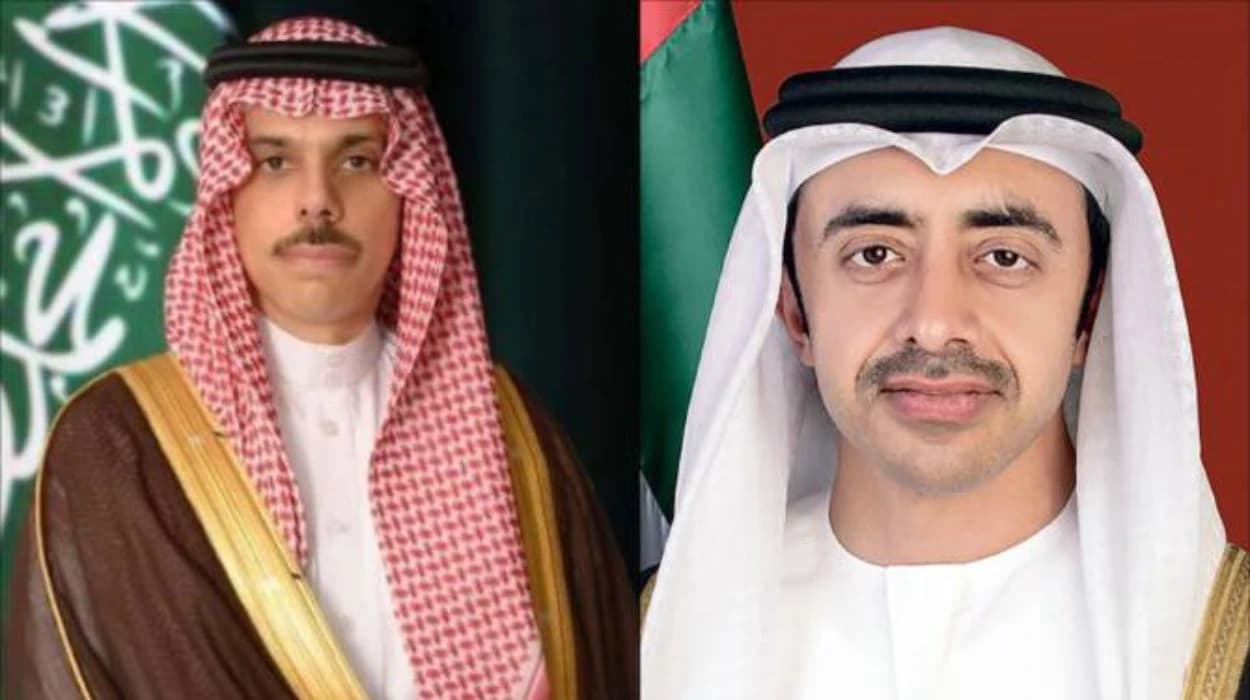The foreign ministers of Saudi Arabia and the United Arab Emirates (UAE) held a crucial phone call on Monday, reflecting the deepening cooperation between the two Gulf powers amid urgent regional and international challenges. The discussion, which encompassed a range of political, economic, and security matters, comes at a pivotal moment when the Middle East remains volatile due to ongoing conflicts and rising geopolitical tensions.
The call was reportedly initiated to strengthen bilateral coordination and support joint efforts in promoting regional stability. Both ministers underscored their commitment to working closely in addressing pressing issues affecting the Gulf Cooperation Council (GCC) countries and the broader Arab world.
Saudi Arabia’s Foreign Minister emphasized that
"Our nations share a common vision for peace, security, and prosperity in the region,"
emphasizing the importance of unity in overcoming challenges. The UAE’s Foreign Minister echoed this sentiment, stating,
"Through dialogue and cooperation, we can confront threats and pave the way for development and stability."
Strengthening Bilateral Ties in a Complex Regional Landscape
The relationship between Saudi Arabia and the UAE, two leading economies and political actors in the Gulf, has evolved significantly over the past decade. Both countries have invested heavily in joint initiatives, especially in economic diversification, energy cooperation, and counterterrorism efforts.
The recent phone conversation reaffirmed their commitment to enhancing diplomatic ties and working collectively in international forums. Discussions included coordination on regional conflicts, with particular focus on Yemen, Lebanon, and the ongoing tensions involving Iran.
In recent years, both Riyadh and Abu Dhabi have taken prominent roles in shaping the regional security architecture. The ministers recognized the necessity of maintaining strong responses to regional security threats, including missile attacks and insurgent activities.
"We stand firm against any actions that threaten the sovereignty and peace of our nations,"
said the Saudi foreign minister during the call.
Addressing Regional Conflicts and Security Concerns
The call highlighted the mutual concern of Saudi Arabia and the UAE over destabilizing activities in Yemen, where both countries have been deeply involved in military and humanitarian efforts. The ministers agreed on the urgency of a political solution and underscored the need for international support to bring parties together for lasting peace.
They also touched upon their shared perspectives regarding Lebanon’s political crisis and the influence of armed groups, noting that regional interference only deepens the country’s woes. Highlighting their positions, the UAE minister noted,
"We advocate for sovereignty and non-intervention as keys to Lebanon’s recovery."
The Iranian nuclear program and Tehran’s regional influence were also central topics. The Saudi foreign minister remarked,
"Iran's activities destabilize the region, and we must act in concert with international partners to counter these threats."
The UAE minister added that diplomatic engagement should be balanced with firm policies to ensure security and deter aggression.
Economic Cooperation and Trade Enhancement
Beyond security, the call also focused on economic collaboration between the two Gulf allies. With both countries seeking to diversify their oil-dependent economies, they discussed strategies to boost trade, investment, and technological innovation.
Energy cooperation, particularly in renewable resources and sustainable development, formed an important part of the conversation. The UAE minister highlighted the shared ambition to lead the region's green transformation, saying,
"We aim to set regional standards for clean energy through joint projects and innovation."
The ministers also agreed on enhancing trade facilitation and customs cooperation to increase intra-Gulf trade volumes in line with GCC economic integration goals. Both sides expressed interest in expanding partnerships in sectors such as tourism, technology, and infrastructure.
International Implications and Partnership With Global Powers
Saudi Arabia and the UAE acknowledged the importance of maintaining robust international partnerships, including with the United States, Europe, and Asian strategic players. The ministers agreed that cooperation with these powers is vital for regional peace and economic progress.
They reviewed their approaches to recent geopolitical shifts, including major developments in the Israeli-Palestinian conflict, and the efforts to normalize Arab-Israeli relations under broader peace frameworks. The Saudi foreign minister remarked cautiously,
"Lasting peace requires fairness and respect for international law."
The UAE minister emphasized the importance of diplomacy, stating that their countries remain open to constructive dialogue with all global stakeholders, aiming to foster a stable environment that benefits their citizens and regional neighbors alike.
Humanitarian Initiatives and Regional Stability Efforts
Saudi Arabia and the UAE reiterated their commitment to humanitarian aid in conflict zones. Particularly focusing on Yemen, the ministers confirmed ongoing support for relief programs that alleviate suffering and facilitate reconstruction.
The discussions also covered refugee support and addressing displacement caused by regional turmoil. The foreign ministers agreed that stability can only be attained when humanitarian needs are met alongside political solutions.
The call demonstrated the joint resolve of these Gulf leaders to act as stabilizing forces in a fractured region. By consolidating their positions and initiatives, Saudi Arabia and the UAE seek to project influence that aligns security interests with development and diplomacy.

